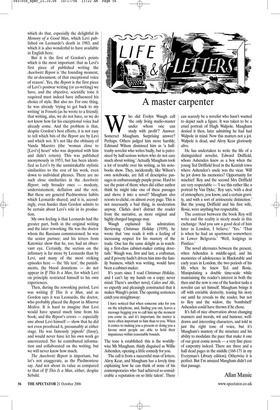A master carpenter
Who did Evelyn Waugh call ‘the only living studio-master under whom one can study with profit’? Answer: Somerset Maugham. Surprising answer? Perhaps. Others judged him more harshly; Edmund Wilson dismissed him as ‘a halftrashy novelist who writes badly, but is patronised by half-serious writers who do not care much about writing.’ Actually Maugham took a lot of trouble over his writing, as his notebooks show. They, incidentally, like Wilson’s own notebooks, are full of descriptive passages in embarrassingly purple prose. Hard to see the point of them; when did either author think he might take one of these passages and shove it into a novel? Maugham also resorts to cliché, on almost every page. This is not necessarily a bad thing, in moderation anyway. Clichés don’t distract the reader from the narrative, as more original and highly charged language may.
Waugh explained his admiration. Reviewing Christmas Holiday (1939), he wrote that ‘one reads it with a feeling of increasing respect for his mastery of the trade. One has the same delight as in watching a first-class cabinet-maker cutting dovetails.’ Waugh was, first and last, a craftsman, and if poverty hadn’t driven him into the family business, which was writing, would have been a cabinet-maker.
It’s years since I read Christmas Holiday, and I can’t lay my hands on a copy; never mind. There’s another novel, Cakes and Ale, so expertly and pleasingly constructed that it makes Waugh’s point. The opening sentences catch you straightaway:
I have noticed that when someone asks for you on the telephone, and, finding you out, leaves a message begging you to call him up the moment you come in, and it’s important, the matter is more often important to him than to you. When it comes to making you a present or doing you a favour most people are able to hold their impatience within reasonable bounds.
The tone is established: this is the worldlywise Mr Maugham, thinly disguised as Willie Ashenden, opening a little comedy for you.
The call is from a successful man of letters, Alroy Kear, and Maugham has a lovely time explaining how he can think of none of his contemporaries who ‘had achieved so considerable a reputation on so little talent’. There can scarcely be a novelist who hasn’t wanted to depict such a figure. It was taken to be a cruel portrait of Hugh Walpole. Maugham denied it then, later admitting he had had Walpole in mind. Now this matters not a jot. Walpole is dead, and Alroy Kear gloriously alive.
He has undertaken to write the life of a distinguished novelist, Edward Driffield, whom Ashenden knew as a boy when the young Ted Driffield lived in the Kentish town where Ashenden’s uncle was the vicar. Will he jot down his memories? Opportunity for mischief: Roy and the second Mrs Driffield are very respectable — ‘I see this rather like a portrait by Van Dyke,’ Roy says, ‘with a deal of atmosphere, you know, and a certain gravity, and with a sort of aristocratic distinction.’ But the young Driffield and his first wife, Rosie, were anything but respectable.
The contrast between the book Roy will write and the reality is nicely made in this exchange: ‘And you saw a good deal of him later in London, I believe.’ ‘Yes.’ ‘That is when he had an apartment somewhere in Lower Belgravia.’ ‘Well, lodgings in Pimlico.’ The novel alternates between the present, when Ashenden is middle-aged, and his memories of adolescence in Blackstable and early years in London, the two periods of his life when he knew Ted and Rosie. Manipulating a double time-scale while maintaining the reader’s interest in both the then and the now is one of the hardest tasks a novelist can set himself. Maugham brings it off with enviable dexterity, teasing his story out until he reveals to the reader, but not to Roy and the widow, the ‘bombshell’ Ashenden could have thrown if he chose.
It’s full of nice observation about changing manners and morals, wit and humour, welldrawn and interesting characters, and told in just the right tone of voice, but it’s Maugham’s mastery of the structure and his ability to modulate the pace that make it one of our great comic novels — a very fine piece of carpentry indeed. There are three and a half dead pages in the middle (168-171 in my Everyman’s Library edition). Otherwise it is perfect. But I’m amazed Maugham didn’t cut that passage.
Allan Massie


































































































 Previous page
Previous page